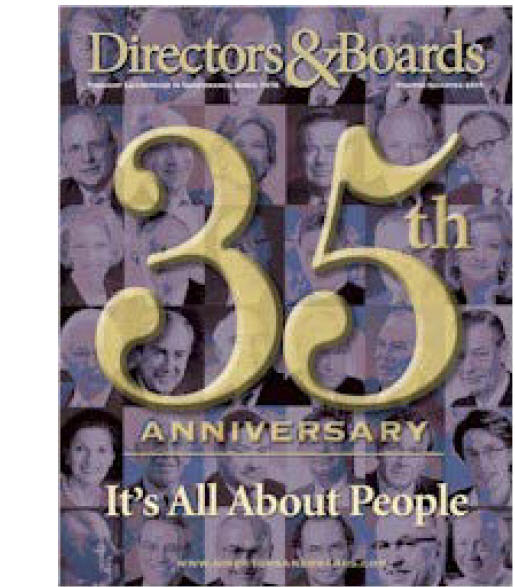 |
 |
Volume 8,
Number 12 • December 2011
|
 |
 |
Some Governance Goodies to End the Year
Prompted by a “Where was the MF Global board?” query from CNBC, here
are several of J. Keith Louden’s prime principles of board
effectiveness. |
CNBC’s ace
correspondent Bob Pisani was the first in the business media that I am aware
of to raise the question, “Where was the MF Global board?” When he came to
me on Nov. 3 for some insight to help answer that question, the point I made
to
Bob was the
accountability of the board for the now bankrupt investment firm’s — read
Jon Corzine’s — changes in strategy and risk appetite. (The New York Times
came out on Nov. 8 with its
well worth reading
“where was the board?” analysis.)
Fresh in my mind when I was making the point about the MF Global board’s
accountability was a fellow named J. Keith Louden.
I had just
put the final touches on a tribute to Louden that is being published in the
35th anniversary edition of Directors & Boards, coming off press this
month. Titled “Keith Louden Knew It All,” our article shines a spotlight on
“one of the early wise men of corporate governance,” which is how I
characterize him. There will be a link to this article at the end of my
editor’s note.
From his vast set of governance experiences, which included serving on more
than 25 corporate boards, Louden formulated many prime principles of board
behavior. These principles guided his own board service, and he transmitted
them as well to countless boards and managements in his consulting and
director education activities. Here are a few, culled from our special
tribute:
-
Failure of
a board and of management to perform effectively is not limited to illegal
or unethical acts. They just get the publicity. As unacceptable as these
are, an even more serious breach is failure to sense the winds of change
and to keep their companies competitive and in a leadership position in
the industrial world.
-
One of the
primary roles of a director is to be ever on the alert for opportunities,
events, information, or anything whatsoever that may have a bearing on the
business of the corporation.
-
The job of
a director is too important to be bogged down by free riders. In addition
to considering the shabby spectacle presented by the noncontributor, the
fact that he is blocking an opportunity for willing and able directors
makes his presence on the board undesirable.
-
A basic
requirement for being a director is experience in management. This
requirement does not apply to industrial management only, since management
is management wherever you find it. Sometimes people will be invited to
membership on a board because of some specific knowledge, such as in the
field of science. Unless this specific, specialized knowledge is
accompanied with an understanding and knowledge of management, such
members rarely make good directors, since they cannot contribute on a
broad base.
-
And,
finally, Louden’s prime principle that informed my response to CNBC’s
“Where was the board?” query: “Directors can delegate authority and
responsibility, but they cannot delegate accountability.”
One thing
Keith knew was how challenging it is to be a corporate director, which
certainly would have been affirmed had he experienced the year just ending.
(He died in 1994.) I am happy to share with you the full copy of “Keith
Louden Knew It All” for your records.
Click here for a copy.
And you won’t want to miss this 35th anniversary special issue.
Click here to start your subscription with this issue.
From the editorial team at Directors & Boards, we wish you a happy holiday
season this month and fortunate times ahead for 2012. Thank you for your
readership and colleagueship.
As always, I welcome your comments at
jkristie@directorsandboards.com.
***
Jim Kristie is the editor and associate publisher of
Directors & Boards.
Directors &
Boards e-Briefing is a monthly service of
Directors & Boards. All contents
copyright 2011, MLR Holdings LLC.
|




